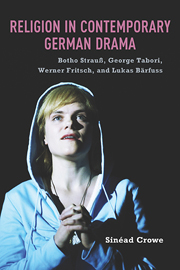 Religion in Contemporary German Drama
Religion in Contemporary German Drama Published online by Cambridge University Press: 05 May 2013
AWARDED GERMANY'S MOST PRESTIGIOUS theater award, the Mülheim Dramatists' Award, and selected by the journal Theater heute as the best play of 2005, Swiss playwright Lukas Bärfuss's Der Bus (Das Zeug einer Heiligen) was by far the most celebrated of the wave of plays exemplifying the “return” of religion to the German theater in the 2000s. Acclaimed for raising urgent questions about secularity, faith, morality, and meaning in the twenty-first century, it consolidated Bärfuss's reputation as a provocative young playwright whose work tackles the most topical issues. A reviewer for Die Welt, for example, described the play as “ein fulminantes, in seiner Rückbesinnung auf den Sinn- und Glaubensverlust der westlichen Welt hoch brisantes Stück” (a brilliant and, with its reflections on the loss of meaning and faith in the Western world, highly explosive play). Meanwhile Katharina Keim emphasized the innovative character of the play's “Blick auf den Einbruch des Religiösen in unsere heutige Welt” (examination of the intrusion of the religious into our contemporary world). As we have seen elsewhere in this study, however, concerns about the loss of meaning, ethics, and spirituality in a supposedly secular society have long been an important point of interest for Germanlanguage playwrights. We have also seen that the intrusion of religion into everyday life has been an important theme in the drama of Botho Strauß for many years. One of the key issues I will investigate in this chapter, then, is whether the claims made for the originality of Der Bus have been exaggerated, or whether the play does indeed offer an innovative engagement with religion that is especially relevant to the twenty-first century.
To save this book to your Kindle, first ensure [email protected] is added to your Approved Personal Document E-mail List under your Personal Document Settings on the Manage Your Content and Devices page of your Amazon account. Then enter the ‘name’ part of your Kindle email address below. Find out more about saving to your Kindle.
Note you can select to save to either the @free.kindle.com or @kindle.com variations. ‘@free.kindle.com’ emails are free but can only be saved to your device when it is connected to wi-fi. ‘@kindle.com’ emails can be delivered even when you are not connected to wi-fi, but note that service fees apply.
Find out more about the Kindle Personal Document Service.
To save content items to your account, please confirm that you agree to abide by our usage policies. If this is the first time you use this feature, you will be asked to authorise Cambridge Core to connect with your account. Find out more about saving content to Dropbox.
To save content items to your account, please confirm that you agree to abide by our usage policies. If this is the first time you use this feature, you will be asked to authorise Cambridge Core to connect with your account. Find out more about saving content to Google Drive.